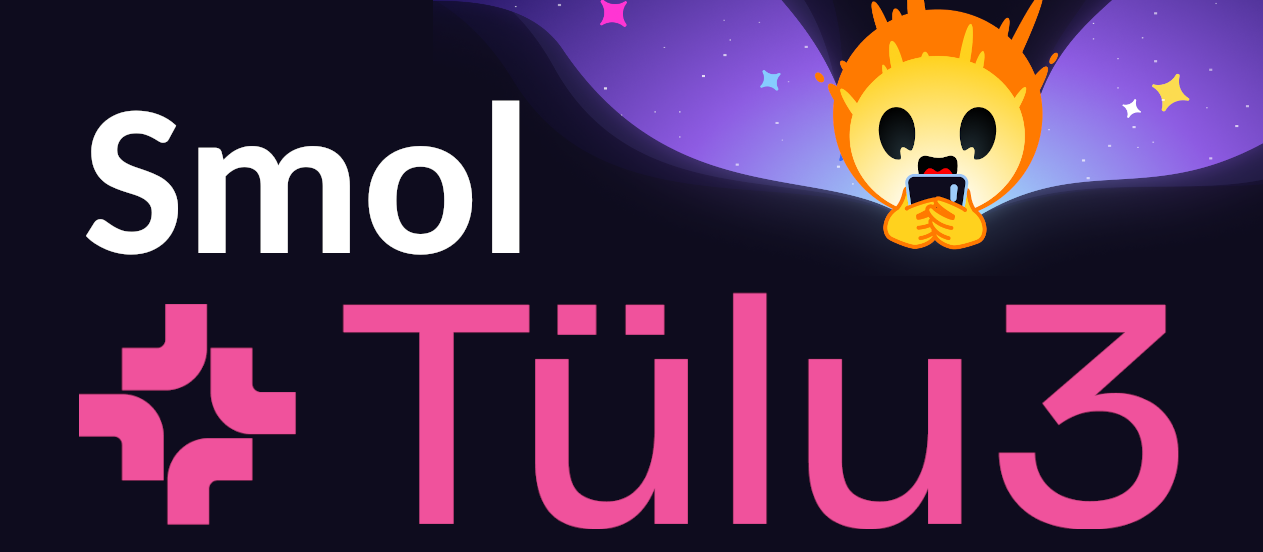license: apache-2.0
language:
- en
library_name: transformers
tags:
- Tulu3
- Smollm
- SLMs
- Small
- Huggingface
- Allenai
- SFT
- DPO
- GGUF
base_model:
- HuggingFaceTB/SmolLM2-1.7B
datasets:
- allenai/tulu-3-sft-mixture
- allenai/llama-3.1-tulu-3-8b-preference-mixture
pipeline_tag: text-generation
model-index:
- name: SmolTulu-1.7b-Instruct
results:
- task:
type: text-generation
name: Text Generation
dataset:
name: IFEval (0-Shot)
type: HuggingFaceH4/ifeval
args:
num_few_shot: 0
metrics:
- type: inst_level_strict_acc and prompt_level_strict_acc
value: 65.41
name: strict accuracy
source:
url: >-
https://huggingface.co/spaces/open-llm-leaderboard/open_llm_leaderboard?query=SultanR/SmolTulu-1.7b-Instruct
name: Open LLM Leaderboard
- task:
type: text-generation
name: Text Generation
dataset:
name: BBH (3-Shot)
type: BBH
args:
num_few_shot: 3
metrics:
- type: acc_norm
value: 12.26
name: normalized accuracy
source:
url: >-
https://huggingface.co/spaces/open-llm-leaderboard/open_llm_leaderboard?query=SultanR/SmolTulu-1.7b-Instruct
name: Open LLM Leaderboard
- task:
type: text-generation
name: Text Generation
dataset:
name: MATH Lvl 5 (4-Shot)
type: hendrycks/competition_math
args:
num_few_shot: 4
metrics:
- type: exact_match
value: 2.64
name: exact match
source:
url: >-
https://huggingface.co/spaces/open-llm-leaderboard/open_llm_leaderboard?query=SultanR/SmolTulu-1.7b-Instruct
name: Open LLM Leaderboard
- task:
type: text-generation
name: Text Generation
dataset:
name: GPQA (0-shot)
type: Idavidrein/gpqa
args:
num_few_shot: 0
metrics:
- type: acc_norm
value: 2.57
name: acc_norm
source:
url: >-
https://huggingface.co/spaces/open-llm-leaderboard/open_llm_leaderboard?query=SultanR/SmolTulu-1.7b-Instruct
name: Open LLM Leaderboard
- task:
type: text-generation
name: Text Generation
dataset:
name: MuSR (0-shot)
type: TAUR-Lab/MuSR
args:
num_few_shot: 0
metrics:
- type: acc_norm
value: 1.92
name: acc_norm
source:
url: >-
https://huggingface.co/spaces/open-llm-leaderboard/open_llm_leaderboard?query=SultanR/SmolTulu-1.7b-Instruct
name: Open LLM Leaderboard
- task:
type: text-generation
name: Text Generation
dataset:
name: MMLU-PRO (5-shot)
type: TIGER-Lab/MMLU-Pro
config: main
split: test
args:
num_few_shot: 5
metrics:
- type: acc
value: 7.89
name: accuracy
source:
url: >-
https://huggingface.co/spaces/open-llm-leaderboard/open_llm_leaderboard?query=SultanR/SmolTulu-1.7b-Instruct
name: Open LLM Leaderboard
SmolLM2 1.7b Instruction Tuned & DPO Aligned through Tulu 3!
SmolTulu-1.7b-Instruct is the first model in a series of models meant to leverage AllenAI's Tulu 3 post-training pipeline to tune the base version of Huggingface's SmolLM2-1.7b! The post training pipeline AllenAI came up with seemed like something perfect to apply here.
This model scores the highest current score in both IFEval and GSM8k while maintaining the extremely low contamination levels in Tulu 3 and SmolLM2! I've listed the datasets used to do both the SFT (supervised finetuning) and DPO (direct preference optimization) stages.
Something important to note, this model has only undergone SFT and DPO, the RLVR (reinforcement learning with verifiable rewards) stage was too computationally expensive to run properly.
Evaluation
I ran these evaluations using SmolLM2's evaluation code for a more fair comparison.
| Metric | SmolTulu-1.7b-Instruct | SmolLM2-1.7B-Instruct | Llama-1B-Instruct | Qwen2.5-1.5B-Instruct | SmolLM1-1.7B-Instruct |
|---|---|---|---|---|---|
| IFEval (Average prompt/inst) | 67.7 | 56.7 | 53.5 | 47.4 | 23.1 |
| GSM8K (5-shot) | 51.6 | 48.2 | 26.8 | 42.8 | 4.6 |
| PIQA | 72.2 | 74.4 | 72.3 | 73.2 | 71.6 |
| BBH (3-shot) | 33.8 | 32.2 | 27.6 | 35.3 | 25.7 |
| ARC (Average) | 51.5 | 51.7 | 41.6 | 46.2 | 43.7 |
| HellaSwag | 61.1 | 66.1 | 56.1 | 60.9 | 55.5 |
| MMLU-Pro (MCF) | 17.4 | 19.3 | 12.7 | 24.2 | 11.7 |
Usage
Just like any Huggingface model, just run it using the transformers library:
# pip install transformers
from transformers import AutoModelForCausalLM, AutoTokenizer
checkpoint = "SultanR/SmolTulu-1.7b-Instruct"
device = "cuda" # for GPU usage or "cpu" for CPU usage
tokenizer = AutoTokenizer.from_pretrained(checkpoint)
# for multiple GPUs install accelerate and do `model = AutoModelForCausalLM.from_pretrained(checkpoint, device_map="auto")`
model = AutoModelForCausalLM.from_pretrained(checkpoint).to(device)
inputs = tokenizer.encode("Gravity is", return_tensors="pt").to(device)
outputs = model.generate(inputs)
print(tokenizer.decode(outputs[0]))
You can also use the model in llama.cpp through the gguf version!
Open LLM Leaderboard Evaluation Results
Detailed results can be found here
To give a more holistic overview, I also added the Open LLM Leaderboard results, which differ a lot from the script that was used to benchmark SmolLM2-Instruct.
As of writing this, the number 1 ranking model in IFEval for any model under 2 billion parameters :)
| Metric | Value |
|---|---|
| Avg. | 15.45 |
| IFEval (0-Shot) | 65.41 |
| BBH (3-Shot) | 12.26 |
| MATH Lvl 5 (4-Shot) | 2.64 |
| GPQA (0-shot) | 2.57 |
| MuSR (0-shot) | 1.92 |
| MMLU-PRO (5-shot) | 7.89 |
Citation
@misc{alrashed2024smoltuluhigherlearningrate, title={SmolTulu: Higher Learning Rate to Batch Size Ratios Can Lead to Better Reasoning in SLMs}, author={Sultan Alrashed}, year={2024}, eprint={2412.08347}, archivePrefix={arXiv}, primaryClass={cs.CL}, url={https://arxiv.org/abs/2412.08347}, }
